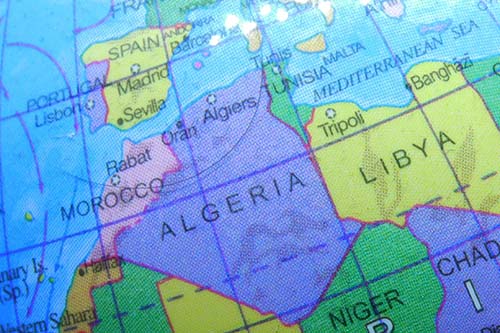- Sep 2, 2021
- ABBC admin
- ABBC News, Business Reports, Recent News
- 0 Comments
By Dr Arslan Chikhaoui / 31 August 2021
Algeria, through its Minister of Foreign Affairs, Mr Ramtane Lamamra unilaterally announced on 24 August 2021 the breakdown of diplomatic relations with its western neighbour, the Kingdom of Morocco. This declaration was made in the continuation of the prior announcement of the High Security Council of Algeria to reconsider the relationship between the two countries following the political, moral and financial support of separatist and terrorist movements by Morocco. As the saying goes, “The straw that broke the camel’s back.”

It is in a diplomatic declaration which wants to be an indictment whose announcement was made on a symbolic date to mark the accusation wrongly made by Morocco on August 24,1994 pointing the finger at Algeria to have fomented the Islamist terrorist attack in Marrakech and for which an apology is still awaited by the Algerian party although it has been proven that it is Moroccan nationals who had set up and carried out this operation of violent extremist organization.
This indictment presents in nine points the existing litigations between the two countries and, also, the acts hostile to Algeria since the sand war of 1963-64 which means that trust and confidence has been broken between the two neighbours. This declaration clearly decouples bilateral disputes from the issue of Western Sahara. This is the first time in the history of bilateral relations that Algeria has publicly brought to the attention of national and international opinion the content of bilateral disputes in order to sweep aside any speculation which attributes the tensions between the two countries solely to the issue of Western Sahara.
This declaration of breakdown bilateral diplomatic relations highlighted the humanitarian fact and which Algeria considers that beyond the closure of the diplomatic missions which will materialize it, the consular activities will remain operational to allow the nationals of the two countries to not be impacted in their daily lives. There are about 12,000 Algerian nationals in Morocco legally settled and about 300,000 Moroccan nationals settled in Algeria, 10% of whom are illegal, or 30,000 who will certainly be expelled.
My understanding of a breakdown in diplomatic relations that is always unilateral is that its implementation will be phased, the first being to wait for the reaction of the opposing side. Indeed, Morocco reacted quickly at different politico-diplomatic levels, regretting this decision of Algeria and qualifying it “unjustified” considering the arguments as “fallacious even absurd”. According to well-informed observers, this reaction from Morocco borders on an insult that only escalates. In the sense that Morocco has reiterated by its official reaction its refusal to respond to requests for clarification from the Algerian side and its stubbornness, is an affront to Algeria. From my point of view, Algeria will move on to other stages by announcing measures such as the introduction of a circulation visa, the suspension of direct air links, the closure of air and sea spaces in addition to the decision to consider that the supply of natural gas to Europe will no longer be via the “GME” gas pipeline which passes through Morocco but via the gas pipeline which connects the Algerian coastal town of Beni-Saf and the Spanish city of Almeria which is the extension of the “MedGaz” pipeline. As a result, Morocco will be deprived of supplying its domestic market with Algerian LNG up to 50% of its internal consumption and royalties of around 1 million cubic meters of gas taken per day. In addition, the impact will be significant on power plants and gas desalination stations on which Morocco has relied for its sustainable economic development.
It is clear that the economic impact will be felt more by the Kingdom of Morocco than by Algeria, especially if the air and maritime spaces will be closed and which will penalize with additional financial costs all movements from the Western Mediterranean to the Eastern Mediterranean and towards the near and middle east region.
According to well-informed observers, in order to achieve trusting, peace and peaceful bilateral relations between the two countries, the settlement of disputes uncoupled from the issue of Western Sahara, which have persisted since 1963, are undoubtedly prerequisites. Also, the media attacks or in other qualified forms of 3rd and 4th generation (Cybernetics, Chemicals, Biologicals, etc.) that Morocco carry out on a recurring basis must without discussion cease. It will only be under these basic conditions that a return to normality could be envisaged. The attitudes and behaviour of actors outside the region (Turkey, UAE, Qatar, China, Russia, France, USA, UK, EU, Israel) and who clash for both geopolitical and geo-economic matters will be decisive in the evolution of this crisis which, in the time being, is a low intensity conflict. It should not be ruled out that it risks developing into a high-intensity conflict if Morocco persists in its obstinacy.
However, this political and diplomatic crisis between the two countries in no way prevents Algeria from tackling the resolution of priority issues in the region. On the one hand, it is about the Libyan crisis and relations with the European neighbourhood. Algerian diplomacy is currently organizing a meeting of neighbouring countries of Libya. On the other hand, it will continue to assert and to be committed as a facilitating role of Algeria in the resolution of conflicts in the Sahel region. In these two cases, Algeria’s efforts have always been undermined by the Kingdom of Morocco, whose ambitions are to keep the area in and under constant tension. Algiers intends to use all its weight to accelerate the process of inclusive political dialogue and reconciliation. In addition, Algerian diplomacy will certainly spare no effort, with respect for the sovereignty of states, to support an appeasement of the Tunisian political crisis through dialogue and concord.
Dr. Arslan Chikhaoui
Chairman of nordsudventures.com
